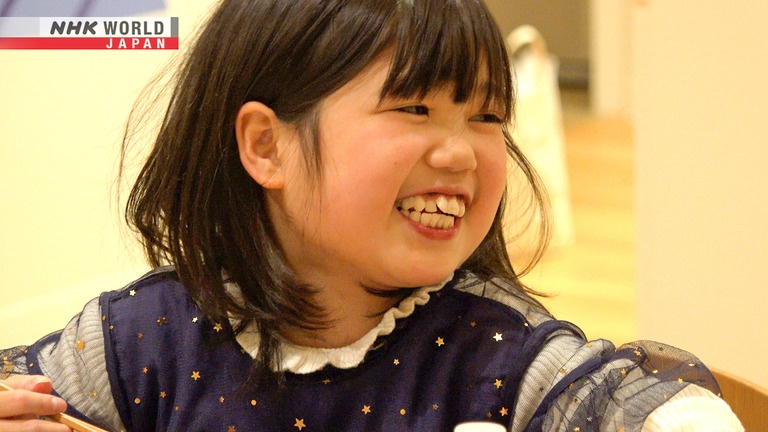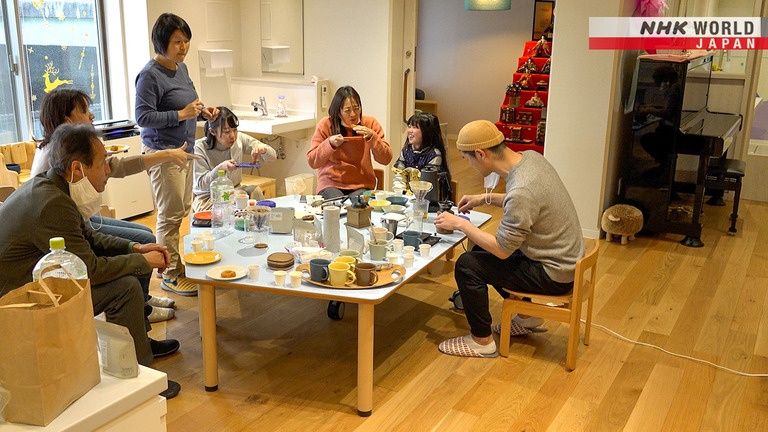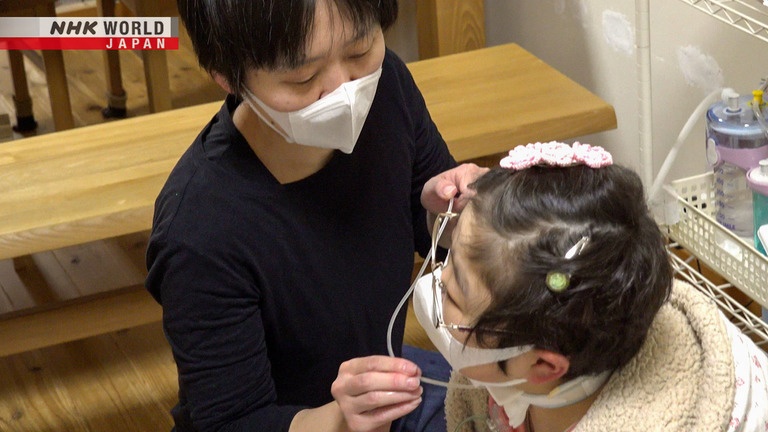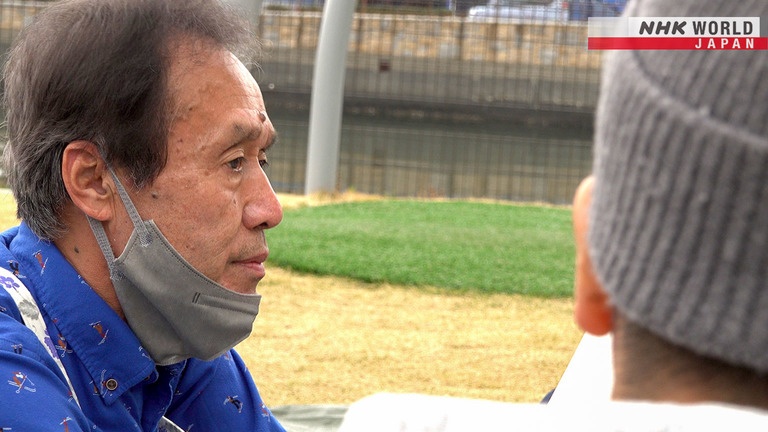Children's Hospice Founder - Tagawa Hisato
Tagawa Hisato is the founder of a unique children's hospice in Yokohama that aims to support families left socially isolated and emotionally and financially drained by intensive treatment for incurable pediatric conditions. Motivated by the loss of his own daughter to cancer aged just six, and remorse at having neglected quality time to focus on treatment, Tagawa works to provide memorable palliative care that helps families to face the end with peace and positivity.




Transcript
FRONTRUNNERS
They said she may not reach adulthood.
So I felt I had to give her the chance to enjoy
what's left of her childhood.
We've always been quite isolated.
Shut away from contact with others.
Smiles give kids the power to carry on.
So we do what we can to achieve that.
Children's hospice founder
Tagawa Hisato
Yokohama's Kanazawa district is the site of a unique children's hospice.
(UMI TO SORA NO OUCHI)
February 2023,
and preparations are underway for a special event.
Can you unload over here?
This unusual cargo is four tons of snow from Niigata Prefecture.
The aim is to give hospice children
the chance for some traditional winter fun.
We have some kids with brittle bones,
so we need to keep things safe.
The following day...
The event welcomes eight seriously ill children and their families.
I'm going in!
Most of them have conditions that prevent long-distance travel.
Over here! Ready? Cheese!
The day was organized by hospice founder, Tagawa Hisato,
who hosts regular events like this
to take children's minds off their conditions.
Fourteen-year-old Kaho has a cardiological condition
that restricts her heart function to just 30% of normal capacity.
She is also unusually small for her age.
Who wants marshmallows!
It's on fire!
It's still burning!
Give that one to your dad!
Delicious!
Nice and gooey.
- Where should I dump this?
- You can reuse it!
- Dad, did it touch your lips?
- Nope, don't worry!
Something that Kaho particularly enjoys about her regular hospice visits
is cooking for the staff.
Let's tuck in!
This time, she and her mother Yumi have made donuts.
How did they turn out?
Nice and firm!
After the taste test,
mom fits one of the staff with some of Kaho's hair extensions.
How do I look?
And next, it's Tagawa's turn.
It suits you!
You look like a hippie!
Or the Mona Lisa!
But after all the fun, Kaho takes a turn for the worse.
Her condition means that she tires very easily,
and she has to lie down with an oxygen mask.
By her side is one of the hospice's several qualified nurses.
- OK, I'm off to the store.
- Thank you!
He's going to the store for us.
She said she wanted some beef and potato stew.
For these kids, every day is a struggle.
Making them smile helps give them the power to face another day.
So we always try to do what we can to achieve that.
Five years ago, Kaho's family were told by doctors
that she might not live another five to ten years.
And her ongoing treatment has largely kept her out of school,
surrounded only by family.
We've always been quite isolated.
She's susceptible to respiratory illnesses,
so even before the pandemic, we all wore masks.
We've always had to shut ourselves away
from much contact with others.
We can't do stuff like this on our own,
so it's great for Kaho to be able to enjoy herself with peace of mind
surrounded by staff who understand her condition.
That's a really big thing.
Time for a forfeit game!
With Kaho feeling better, Tagawa, now back from the store,
cooks dinner within earshot of their card game.
For parents, I think it's a relief just to have us here
gently watching over their children.
It gives them peace of mind.
We have specialists here for both play and for care.
I just watch on from a distance.
Like a kind of grandfather figure.
Dinner's almost ready!
Bon appetit!
- Tagawa-san, this is great!
- Really? Thank you!
For children who are undergoing treatment, things can be scary,
and they have to deal with an awful lot of stuff,
which is tough for them.
So away from all that, being able to spend time like regular children
is really important to their development.
And that time is important for parents, too.
Tagawa Hisato's hospice was inspired by his own daughter, Haruka.
Twenty-five years ago, at the age of just six,
she was diagnosed with a brain tumor
and given only six months to live.
I just couldn't process the idea
that she wouldn't still be with us six months down the line.
All I could think about was what could be done to cure her,
or even just give us some more time together.
As the illness progressed,
Haruka experienced a growing paralysis down her right side.
Even amid all that, you could see her growing up.
She used to play the melodica,
and even when she couldn't use her right hand,
she got really good with her left.
It really showed me the power that kids have.
With her condition worsening, at Haruka's behest,
the family took a trip together to the seaside
where they had holidayed once before.
We ate together in a restaurant,
and all day, Haruka led the way for us.
But on the drive home, she drifted off to sleep,
with this expression on her face
that looked so peaceful and contented.
I'll never forget it.
The following day, she stopped breathing.
Haruka passed away a few days later,
just five months after her initial diagnosis.
I thought a lot about
whether I'd managed to really be there for her as a parent
in that short remaining time together.
I obsessed constantly over the thought that I could have done more.
That was the spur for Tagawa to set up an NPO
parallel to his day job,
with the aim of supporting children like Haruka and their families.
And in the course of those activities,
he learned of a children's hospice in the UK,
and went to visit in person.
It was a place for kids and their families
to escape from the grind of their treatment.
It gave them the chance to spread their wings
and experience life in a space away from the home.
I realized that we needed something similar in Japan.
Back in Japan,
he began traveling to promote the benefits of children's hospices.
And in the process, he secured over 300 million yen in backing
from companies and private investors.
Finally, after seven years of hard work,
2021 saw him open the first children's hospice in Eastern Japan.
Welcome! Come in!
The very first user was five-year-old Kajiwara Emma.
Diagnosed at the age of two with pediatric neuroblastoma,
she was not expected to live to the age of ten.
And her compromised immune system
also placed most typical play opportunities off limits.
Let's play hide and seek!
Rock, paper, scissors, go!
Ready?
Not yet!
The bathroom seems like a good place to hide.
I can see somebody's feet!
You found us!
- Come back soon!
- I will.
You know what happens if you break a pinky promise!
I'll come back again and again!
Emma would even spend her sixth birthday here.
Happy birthday, Emma-chan.
Knowing of her fondness for princesses, Tagawa gave her her own tiara.
And staff and family gathered to wish her a happy birthday.
It reminds me of my own daughter all those years ago.
Each day comes only once in a lifetime.
But enjoying every moment to the fullest creates happy memories
for children and their families.
And Tagawa's hospice also plays an important role for parents,
including Yoshida Keiko.
Her daughter Momo was born with a congenital heart condition,
accompanied by complications that necessitated a tracheostomy.
What's for dinner tonight?
Well, we have some fish.
- And?
- Is amberjack OK?
What? Is that all there is?
Wait there a moment.
Mom switches Momo's portable oxygen supply for her home unit.
Working OK? Good.
How's your phlegm?
Single parent Keiko manages all of Momo's care almost single handedly.
Despite the exploration of various treatment options,
all major surgical interventions were deemed too risky,
and Momo has arrived in her late teens with no ultimate cure in sight.
At the age of four we were told she might not reach adulthood,
that is, in the absence of any surgical solution.
We've always been told that
her late teens were about as long as we could hope for.
We've never been able to just go off on a trip
and stay somewhere together.
The pandemic has made it even more important to avoid crowds,
but in that time, we've reached her late teens.
So I felt I had to give her the chance
to enjoy what's left of her childhood.
Momo's first visit to the children's hospice was in May 2022.
Rock, paper, scissors, go!
She joined the staff for a round of "The Game of Life."
Ooh, an engagement ring!
"Pay 250 grand"?! I don't have that!
Since then, she has come here once a month,
and embraced all sorts of new activities,
including gardening and playing the piano.
Recently, she's been putting her energy into sharing messages
for other seriously ill children via social media.
Good luck! We'll be sitting quietly over there!
Hi there!
Let's wait a moment for people to join.
I feel a bit nervous.
What's today's topic?
Today, I'm going to be singing.
To try and encourage her followers,
she's been practicing this song for the last six months.
Thank you!
I just about made it through!
Just taking her to the hospice is a great source of fun,
which makes me feel better as a mom.
Like, I'm finally helping my daughter have fun.
I can finally feel like a proper parent.
Eighteen months since the hospice's opening,
it's already welcomed some 200 families.
And in that time, some ten of those children have passed away.
Including, in August 2022,
their very first user, Kajiwara Emma.
It doesn't feel right to talk about destiny.
But I feel we did everything we could under the circumstances.
The hospice really helped us
give Emma the childhood she deserved.
They really helped expand her world,
so we can't have any major regrets.
But...
I really wanted to see her make it to elementary school.
I'm sorry.
And of course, we wanted to watch her grow up.
After Emma's passing,
Tagawa invited her mother Masumi to help out at the hospice.
She gladly accepted, and now provides extra support two days a week.
Finding the hospice was life changing for us.
So when they invited me to come and help out,
I didn't even need to think about it.
And... I think Emma would be happy with that decision.
I feel like she's with me whenever I come here.
Tagawa and his team place considerable focus on
how best to support bereaved parents.
The hospice currently holds monthly gatherings
for parents to come together and talk through their grief.
Will we have time for introductions?
I think we can make time.
Emma's father will be joining us, too.
The next event is aimed at fathers
who seldom take part in such activities.
A lot of fathers don't really feel
all that keen to get together and talk about their feelings.
I suppose that reflects a very male mentality.
As a way to encourage fathers' participation,
they hit upon the idea of a barbecue.
That's a lot of meat and sausages.
I guess so!
I felt that a barbecue might provide a setting
where people feel they can talk.
The day of the event arrives.
Attendees include four fathers
who have lost their own children to illness.
Thank you for coming today.
This father lost his daughter to cancer two months ago.
Are you coming to terms with things?
Not at all... It's tough.
It's all still very raw.
I get all these intrusive thoughts.
I think a lot of fathers don't really express the things
that are eating them up.
And that can feel like a massive burden.
I don't know what it's like for other fathers.
But I found it hard, really hard after my son died.
Even now, it's like being in Hell.
I shouldn't say that, but it feels like walking through Hell all alone.
I get really down, but I don't want people to see me like that.
I feel like people treat me differently, and try to avoid the subject.
And I hate that, too.
Emma's father, Masamichi, also joins in the conversation.
Thinking about her too much just makes me sad, so I try not to.
Whenever I do, I start crying,
so I feel like I try not to think about her.
It's worse if I'm in the house, so I try to get outside.
But walking around,
there's so many places with memories attached to my boy.
I can almost see him, running over to me, shouting "Papa."
And then it really hits me. I get so sad.
When Kajiwara-san said he'd taken up running,
with tears streaming down his face, I recognized that.
And I shouldn't say it, but it made me feel better.
Events like this can be a vital opportunity
for fathers to work through their grief.
What are Tagawa's take homes from the session?
I realized that it's really important to these men
that they are able to hold on to their dignity as fathers.
And listening to them today,
I think they are starting to feel like...
perhaps a way out of the nightmare they're currently experiencing
is not all that far away.
Hello.
Tagawa's next goal
is to expand the children's hospice model to other parts of Japan.
This group of nurses is hoping to launch one in Aichi Prefecture.
Based on first-hand experience,
Tagawa outlines the needs of children and parents.
I think it's important to be a place
where families can get away from it all
and forget about their illnesses.
Running this facility has taught me that.
So that's what people are looking for when they come here.
So, what is it that motivates Tagawa Hisato as a "frontrunner" in his field?
I believe what we do has been important
to these children battling with illness,
including those who've lost their lives along the way.
And they've taught me the benefits
that a facility like ours can bring during their struggles.
And I feel that the power of these children has also changed my life.